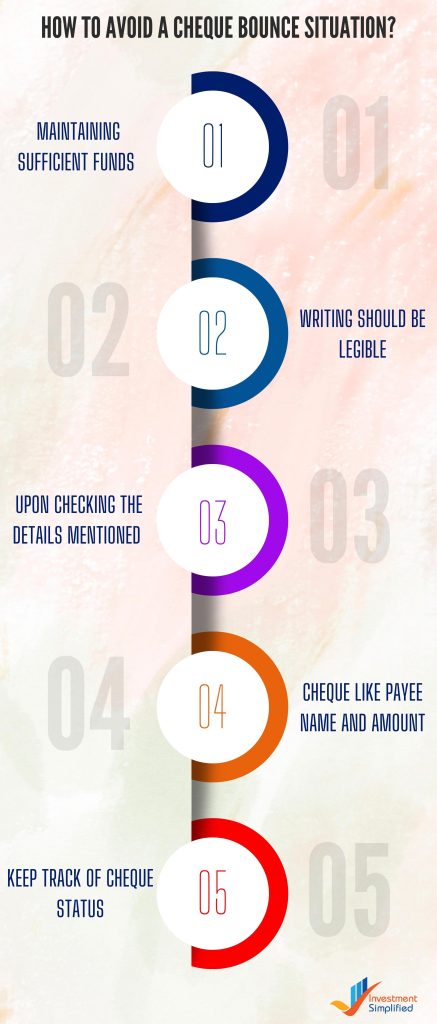Have you heard someone saying that their cheque got bounced with a frown on their face? Well, that’s what a cheque bounce brings – a troublesome and embarrassing situation! Let us teach you all about cheque bounce and how to avoid it.
Cheque Bounce Meaning
A cheque is a written document that an issuer gives to their bank to pay the mentioned amount in this document to the payee. But how does the bank pay this amount? Naturally, from your bank account.
But if there are insufficient funds in your bank account upon which you’ve issued the cheque, the bank will not be able to pay the money to the person in favour of whom you wrote the cheque.
This is the meaning of cheque bounce, i.e. a situation when you cheque is bounced back to you because of insufficient funds in your bank account.
Cheque Bounce Reasons
Although the most common reason of a cheque bounce is insufficient funds in the issuer’s bank account, there are a few more reasons due to which your cheque might get bounced or dishonoured. Let’s look at the reasons:
- One of the most common reasons for a cheque bounce is insufficient funds in the issuer’s bank account. Due to this, cheque will bounce and penalty may also be levied.
- If the signature on the cheque do not match with the bank records, cheque will 100% be rejected by the bank and thus be bounced.
- Overwriting also is a major cause of cheques being bounced.
- If a cheque is presented 3 months after the date of issue written on the cheque, banks will most likely decline it and lead to dishonouring of the cheque.
- Frozen account: If the account holder’s account is frozen due to legal or other reasons, any cheques issued by them will bounce.
- Bank errors: Sometimes, a cheque may bounce due to errors made by the bank, such as misreading the amount or account number. If the fault is at the bank’s end, customer will not be charged with any charges or penalties.
It’s important to note that bouncing a cheque is a serious issue and can result in legal action, if it is due to insufficient funds; cheque bounce may damage one’s credit rating too.
Also Read: Types of Cheques in India
Cheque Bounce Charges
The fee or bank charges for a bounced cheque vary from bank to bank. Please note that the banks also charge GST as per the applicable GST rates on cheque bounce charges.
Let’s take a look at the cheque bounce charges by some of the banks in India:
- SBI Cheque Bounce Charges: Rs 500
- HDFC Cheque Bounce Charges: Rs 550
- PNB Cheque Bounce Charges: Rs 150 – Rs 500
- ICICI Cheque Bounce Charges: Rs 500 (Rs 50 for non-financial reasons)
- Axis Bank Cheque Bounce Charges: Rs 500 per cheque
- Bank of Baroda Cheque Bounce Charges: Rs 250/ Rs 500/ Rs 750 for cheque amount of up to Rs 1 lakh/ Rs 1,00,001 to Rs 1 crore/ above Rs 1 crore, respectively
- Bank of India Cheque Bounce Charges: Rs 300/ Rs 500/ Rs 2,500 for cheque amount up to Rs 1 lakh/above Rs 1 lakh to Rs 1 crore/above Rs 1 crore, respectively
- Indian Bank Cheque Bounce Charges: Rs 250/ Rs 500/ Rs 750 for cheque amount of up to Rs 1 lakh/ Rs 1,00,001 to Rs 1 crore/ above Rs 1 crore, respectively
- Canara Bank Cheque Bounce Charges: Rs 200 to Rs 2,000 (for amounts below Rs 1000 to Rs 1 crore and above, respectively)
- Post Office Cheque Bounce Charges: Rs 50, irrespective of cheque amount
If the cheque is returned due to technical reasons or if the customer is not at fault, no charges are to be levied by the bank – as per the RBI guidelines.
How to Avoid a Cheque Bounce Situation?
Here are some tips on how to avoid a cheque bounce situation:
- Maintaining sufficient funds is of prime importance
- Writing should be legible with no overwriting
- Upon checking the details mentioned on the cheque like payee name and amount
- Keep track of cheque status

By following these tips, you can avoid a cheque bounce situation and maintain a good financial reputation with your bank and clients.
Legal Process when a Cheque is Bounced
In India, cheque bounce or dishonoured cheque is a criminal offence under Section 138 of the Negotiable Instruments Act, 1881. The legal process for a cheque bounce in India is as follows:
Step 1: First, you must send a legal notice to the person who issued the cheque within 30 days of cheque bounce. Make sure that it contains the cheque details, cheque amount, reason quoted by your bank for the dishonoured cheque and the demand for the payment of the due amount.
Step 2: Next, if the liable person pays the amount within the stipulated time, there is no need for further steps and the matter stands resolved.
Step 3: This step comes if the 2nd step is not fulfilled. If the person does not make the payment within 15 days, the next step is to file a complaint in court having jurisdiction over the matter. The complaint should be filed within 30 days of the expiry of the notice period.
Next, you’ll be required to attend court proceedings as and when you’re summoned. Please note that this is only an indicative elaboration and the exact technicalities must be discussed with your lawyer.
Also, read more articles related to Cheque:
Cheque Bounce: FAQs
A cheque bounce case may happen due to reasons like insufficient funds, mismatch in signature, incorrect name mentioned and damaged cheque etc.
Bounced cheque charges can vary from Rs 50 (for non-financial reasons) to Rs 500.
Yes, as per the RBI guidelines, banks are supposed to return all the dishonoured cheques to the issuers or payees within the stipulated time while stating the reason for cheque bounce.
Under Section 138 of the Negotiable Instruments Act, 1881, the person who issued the cheque can be prosecuted and may face imprisonment for up to two years, or a fine that is two times the amount of the cheque, or both.
Yes, a cheque can bounce due to a signature mismatch. The bank compares the signature on the cheque with the signature on record with the bank. If there is a mismatch, the cheque can be dishonoured and you’ll be charged with fine too.
Yes, a post-dated cheque can bounce if it is presented for payment before the date mentioned on the cheque. If someone tries to cash a post-dated cheque before the due date, the cheque will be dishonoured.
Yes, a cheque can bounce due to a technical error made by the bank, such as a wrong account number or amount. In such cases, the bank will rectify the error and re-present the cheque for payment.
Yes. Insufficient funds in account can lead to cheque bounce.




